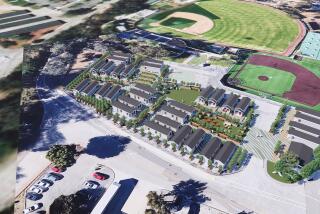UCLA to Sell Part of Faculty Subdivision : Real estate: Westchester houses will be offered to the public. They were built to lure professors, but few have bought there.
- Share via
UCLA officials announced Thursday they will allow the public to buy up to two dozen homes in a largely vacant Westchester subdivision originally built exclusively for professors, conceding it was the only way to keep from losing money on the project.
The university built the $42-million subdivision of 86 homes--called The Bluffs for its hilltop views of the ocean--to help recruit senior faculty members who might be tempted to turn down job offers because they could not afford a home in Southern California.
Conceived during the 1980s real estate boom, the idea was for the school to offer the three- to five-bedroom homes, located about 30 minutes from the Westwood campus, to incoming UCLA faculty at prices as much as 30% below market value. A 1987 housing survey suggested that nearly 60% of faculty recruits would buy such houses and that the mid-$400,000 to high-$600,000 prices would be within the reach of 129 new professors over three years.
But by the time the project was completed last fall, UCLA couldn’t find a single buyer. Housing prices had taken a 30% nose-dive, wiping out any bargain appeal, and state budget woes forced the university to curtail its hiring.
School officials hoped to spur interest by dropping prices an average of $35,000 on each home and offering flooring and landscaping upgrades. But only seven faculty members have purchased homes, said Brad Erickson, UCLA’s associate director of real estate. Two others have signed leases with options to buy--one family that was displaced by last fall’s Malibu fire and another displaced by the Northridge earthquake.
At that rate, it would take UCLA more than three years to sell off all of the homes to its faculty--not fast enough to repay the First Interstate Bank construction loan and recover all the project’s costs, Erickson said.
“We would have a loss and the only way to avoid the loss is to open it up to the public,” Erickson said.
The original loan agreement requires UCLA to repay the full $42 million to First Interstate in June and obligates Chancellor Charles E. Young to use other campus funds if housing sales fail to cover the debt. But a spokesman for the UC treasurer’s office in Oakland said Thursday that the university system is engaged in “positive negotiations” with the bank to restructure UCLA’s repayment.
After receiving permission from University of California regents in January, Young finally decided Thursday morning to allow the public purchases of the homes, Erickson said.
“The chancellor clearly, clearly is upset that this is something that has to be done, but he recognizes that it’s really a prudent thing to do,” Erickson said. “He’s not upset simply at the fact that we have to sell a few homes to the public. What’s frustrating to him is that it highlights what’s happening to the university generally.”
More than 300 people not affiliated with UCLA have signed up for a chance to buy the homes, he said. They will be allowed to tour selected models, most likely at the end of the month, and will be invited to submit bids that could be unsealed in early April.
“A lot of these homes on the bluffs are premium homes with premium views, and we want to capture that premium,” Erickson said. “We want to at least break even on this project, and the only way to do that is to go out to the public.”
After selling off the first two dozen, Erickson said UCLA will re-examine its future faculty recruiting plans and may make more homes available to the public.
“The world has changed and we did not foresee the extent the world would change, in terms of local real estate prices and what has happened to the state and university,” Erickson said. “If the university were prospering wildly, a decision might have been made to hold on to this project for its institutional purpose. But the university, like everyone in Southern California, has been suffering and has got to cut its losses.”
More to Read
Sign up for Essential California
The most important California stories and recommendations in your inbox every morning.
You may occasionally receive promotional content from the Los Angeles Times.






